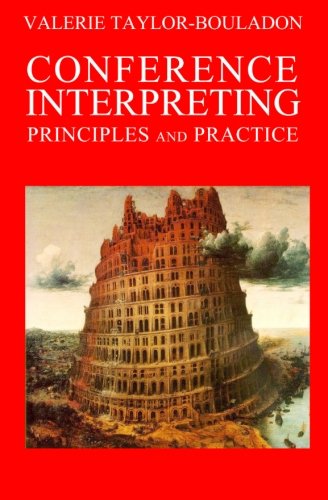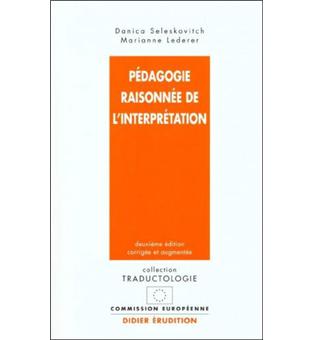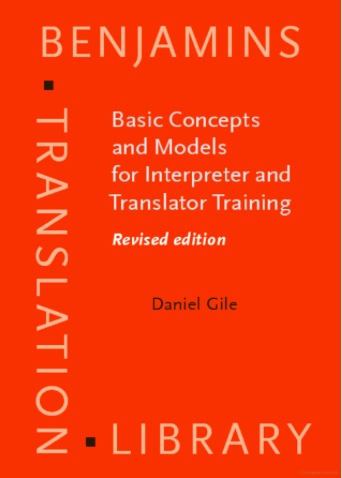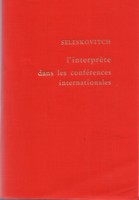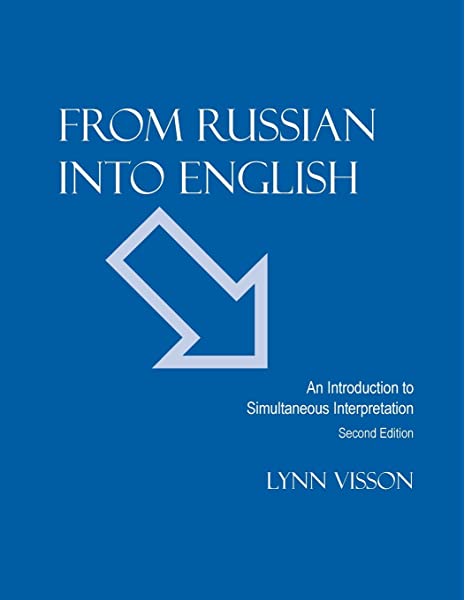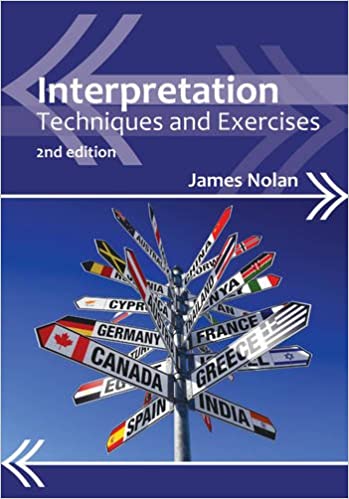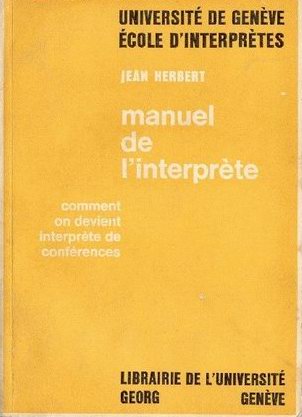The following text is taken from by Valerie Taylor-Bouladon’s extremely useful book, Conference Interpreting – Principles and Practice, and was kindly sent in by the author herself.
Conference Interpreting – Principles and Practice. Tayor-Bouladon, Valerie, Crawford House Adelaide. 2001
Spit and Polish
Booth behaviour and microphone manners
Punctuality
The only people who must always be on time for meetings are the interpreters. Sometimes at WTO your 9 a.m. meeting did not start until 11 o’clock but the interpreters had to be there, ready, because the moment the private negotiations taking place all round the room were over, the official meeting would start and there was no knowing when that would be. The official meeting might last ten minutes and then adjourn. In UNCTAD the meeting scheduled for l0 o’clock might not start until twelve-thirty but similarly the interpreters had to be there and ready at l0. It is not a good idea to arrive at the last minute, hair awry and out of breath. From the delegate’s point of view, it is most unpleasant to listen to a breathless voice, obviously unprepared for the meeting, panting into the microphone and switching off to ask in a loud, desperate voice:”Which Committee is this? What are they talking about?”
Your group of delegates might habitually arrive late but the day you do, you may find they were on time. Interpreters need to be in the booth fifteen minutes before the scheduled starting time to check whether there are any changes in the programme, any new documents have been circulated or any ad hoc working groups convened, and so on. You may find when you arrive at the scheduled meeting room that the venue has been changed and that your group is meeting in a different wing of the building that will take you ten minutes to find. Or that there has been a last-minute team switch because of a change in the languages required. Better be early so you have plenty of time to sort out the documents that will be needed, and find out where they are on the Agenda.
Team spirit and solidarity
Team spirit and solidarity are the order of the day. Your team will be judged as a whole. Try to help one another by sharing vocabulary, proposed translations for new words, new technologies and new scientific concepts that have come up. You may have a mental block about one word and it keeps coming up – that is when your colleague can respond to a signal of distress and give invaluable help. If you are experienced, do not keep your know-how to yourself. Do not forget that not only are interpreters judged as a team but also that we were all beginners once. Similarly, if a colleague doesn’t know something, don’t spread it around thereby creating a source of tension but rather try to help discreetly. Remember, though, that there is nothing more irritating than a colleague determined to help when you don’t need it, who keeps pushing notes in front of you or, even worse, whispering suggested wording when you prefer to do it your own way ! If you want help from your boothmate, ask for it – scribble a few words on the notepad. If you do not, also say so. If you are a beginner and by chance know an expression or technical word which your more experienced colleague may not know, don’t antagonise him by gloating over it – you may need his help on another occasion. The best way to help your colleague is to write your suggestion on your own pad in front of you, without any fuss, so that he can read it if he wants to.
While your colleague is “on the air” you may notice he hasn’t realized the delegate is reading from a text and is struggling with something that in fact already exists in an official text. See if you can find it in the appropriate language quietly and place it in front of him discreetly, without disturbing him.
Sound levels
If there is a considerable difference in volume between your voice and that of your colleagues, the sound engineer will adjust the output volume whenever there is a switch from one to the other. Try to speak always from the same distance from the microphone and do not turn away while interpreting. Do not rustle papers, pour out water, drum your fingers on the work surface, etc. in front of an open microphone. Avoid noisy bangles in the booth.
Posture
Posture is important in voice production and the work is far less tiring if your posture is correct. A slouching interpreter will not sound bright and alert, nor even reliable. Think of all you have heard about body language. All of this also applies to your posture as you sit in the booth (See Chapter 11 regarding the Alexander Technique).
When not actually interpreting, do not leave the meeting room for longer than absolutely necessary and in your own interests avoid returning at the last minute before taking over the microphone. When not working you should relax but continue to listen to what is being said and be firm but courteous with people who drop by for a chat. If your colleague has to leave the booth for a short while, do not abruptly hand over the microphone the moment he returns – give him time to pick up the thread of the discussion again. Brief your colleague on how far the discussion has progressed and on anecdotes or unusual terms used by speakers. Likewise, if a new team is taking over after you, leave them a note in the booth telling them how far the discussion has progressed on which item and which document will be taken next, as well as any other useful information.
As a general rule, respect your colleagues’ wishes (even unspoken) regarding socialising in the booth. Not every interpreter is able to deal with a speech from the floor and your life story in all the gaps. Do all you can to establish good working relationships with your colleagues – you all need to be able to depend on one another.
Even if you think you are one of the best known interpreters in the profession, introduce yourself to colleagues you have not met before. Experienced interpreters should make every effort to put newcomers at ease and beginners should concentrate on doing a good job rather than impressing their boothmate. It is good to include a beginner in a team because they are the next generation of interpreters. However, it is also a good idea to obtain the agreement of the more experienced colleagues first and be sure to put the beginner in a booth with an experienced, helpful colleague who will be kind and cooperative. Beginners should be used in meetings where they can prepare beforehand. It is unfair to offer them meetings which are difficult and require experience because they may jeopardize their future career.
Documents
Try to keep documents in logical order and by language – try not to disturb whatever system is agreed between colleagues sharing a booth. When the meeting is over, it is well worth taking ten minutes to put all the documents back in order ready for the next day. When your colleague takes over from you, pass over the pile of documents in the right order if possible. If the organisers have asked that the documents be returned to them at the end of the meeting, be sure to do so.
Beware of handing over copies of speeches or documents to enquiring journalists or visitors. You have a duty of confidentiality. Always refer such requests to the team leader or chief interpreter.
Booth manners
Smoking is not prohibited in public buildings in all countries but do not smoke in the booth even if there are no non-smoking signs – it is generally forbidden in conference rooms and booths anyway. Similarly, use perfume or aftershave sparingly. Too heady a scent can be as intrusive as tobacco smoke and becomes overpowering in a small enclosed booth.
It is not advisable for the same reason to varnish your nails in the booth when you are not working or even during the coffee-break. Nor is it advisable to knit, sew, manicure your nails, or be seen to be reading a newspaper or snatching a late breakfast in full view of the delegates.
Not only is such behaviour likely to disturb your colleagues but it is also unlikely to impress the organizers and delegates with your professionalism. Do not take your mobile telephone with you into the booth unless you have checked that it is turned off. Beware of blowing your nose or coughing with the microphone on. Pity the ears of the delegates listening to the interpretation.
Use the cough button Do not switch the microphone off when coughing, pouring water, rustling paper, because an intruder has burst into the booth to bring documents, to ask your colleague a word you have not understood or to make a brief sarcastic comment about what the speaker has just said. When you do this, the delegates’ listening to you will suddenly have their ears blasted with the floor channel which is probably gibberish to them and louder than the interpretation: there is invariably a difference in sound level. Use the cough button. Do not switch off your microphone until the speaker has finished. If your boothmate is working, go outside to cough or blow your nose.
Only interpreters may speak over the interpretation channels. Sometimes a visiting interpreter, who may be part of a delegation speaking a rare language such as Korean or Farsi, may come into the booth to interpret into English a speech to be delivered by his delegation. This is then interpreted into the other conference languages by relay.
Microphone manners
Before the first session of the conference it is advisable to check that you know how the equipment works, how to switch to the required channel if there is relay and that in general the equipment is working to your satisfaction, the headphones are comfortable and the sound is right for you. When you come into the booth for subsequent meetings, make sure the microphones have not been left on by mistake by the technician, or earlier colleagues. It would be embarrassing for your private conversation with your colleagues to be broadcast all over the room. Beware of forgetting to turn the microphone off when you finish a speech. By leaving your microphone switched on after you have finished interpreting you may be preventing delegates from hearing something the Chairman has said.
A professional interpreter turns the microphone on the moment he begins to speak and not before, and turns it off the moment he has finished. Failing to turn the microphone off immediately is courting disaster. Delegates do not want to year your comments, or the rustling of papers, coughing, nor do they want to hear the comments of your highly-strung colleague who erupts into your booth to let off steam about the stupidity of the delegate she has just interpreted. Beware of making comments – a microphone light may be hidden by a sheaf of papers. Do not laugh too loudly – this may be picked up by a microphone left on in the booth next door.
A survey carried out by Jennifer Mackintosh shows that delegates attach greatest importance to accuracy, clarity, correct terminology and completeness, and do not like too much lagging behind the speaker and pauses. (See Appendix B entitled “How to irritate your delegates without really trying”). They want interpreters to concentrate on the essentials and to have an understanding of the subject under discussion. They want clear enunciation. I remember an embarrassing incident some years ago when the English booth, interpreting from Russian, gave the meeting the impression the Soviet Union was placing 45 vessels at the disposal of the World Weather Watch when in fact they were offering four to five.
Correct terminology is very important as is broad general knowledge and wide cultural background. According to the survey Jennifer Mackintosh carried out, English, French and German are the most common languages, with English being used at 98 per cent of the meetings, French at 88 per cent, German at 61 per cent, Spanish at 41 per cent and Italian at 16 per cent. Lower down the list come Dutch, Russian, Portuguese, Arabic, Japanese, Chinese, Danish and Finnish, in that order. The survey indicated a direct correlation between pre-conference distribution of documents to the interpreters and high delegate satisfaction, particularly in the area of correct terminology and general understanding of the subject matter.
Remember, life is not always easy for delegates. Some have to wear headphones most of the time and they are less well protected from extraneous noise than we are. It is tiring enough to have to follow several days’ discussions and when this has to be done via simultaneous interpretation equipment it becomes very demanding. So try to make your voice pleasant to listen to. Avoid a monotonous tone. Always seek to be clear and lively. It is advisable to keep your animation level similar to that of the speaker you are interpreting. Sometimes the speaker may be droning on in a peaceable manner, but if you switch to the various booths you might be forgiven for thinking that he was declaring war judging by the high-pitched tone coming from some of them.
If a speaker is having to use a language other than his normal working language, try to convey the message with clarity. Never alter the emphasis of what is being said, never let your own views on the subject show through your tone of voice. Your job is to communicate the speaker’s intended meaning. It is only too easy for an unscrupulous interpreter to sabotage an argument especially if the delegates listening are monolingual. You have a responsibility and a duty to be accurate. It is dangerous, too, to try to improve on what you hear because sarcasm or vagueness may be deliberate.
The golden rule is: as literally as possible, as freely as necessary. Be fluent in your delivery and as close to the patterns of spontaneous speech as possible. Do not speak in sharp bursts followed by long pauses, nor in a sing-song voice. Do not speak in a soporific manner, especially after lunch … Match your register to that of the speaker and the audience. If the speaker is using simple, plain words do not distort the original by using abstruse terms or arcane expressions. Conversely, do not lapse into a familiar, jocular tone or slang expressions on formal occasions.
Numbers
Always quote document numbers clearly, if possible twice. If your delegates still look lost, say the number again.
Try to form a partnership with your listeners
Ask for their help when documents are being distributed or if floor microphones are not working properly. Acknowledge their responsiveness. Enlist their help in slowing down fast speakers by saying something like: “We regret it is not possible to interpret accurately when a speaker is going at this speed. Please help us to help you understand by asking the Chairman to slow the speaker down.” If you still don’t get any response you may add: “We are doing our best under the circumstances but unless the speaker slows down the interpretation will not be complete.” Do not shout this into the microphone or bang on the booth window. Quiet appeals for help through the microphone are much more effective. If the speaker’s microphone goes off, it is better to say so quietly into your microphone so that your audience knows what is happening and that it isn’t you who have dried up. If the speaker moves away from the microphone so that you can only hear faintly, do not try to interpret. You must only interpret when you can hear properly. If you make a mistake you are responsible for it and once you have imparted inaccurate information the deed is done and no-one will be interested in your explaining during the coffee-break that you couldn’t hear properly. It is your duty to provide an accurate interpretation come what may.
Microphone feedback
A sudden high-pitched screaming noise may come through your headphones due to a speaker leaning too close to his microphone with his headphones on. Take your headphones off immediately before your ear-drums are damaged, preferably siIently, and signal to the technician what has happened.
Introduce yourself to the technicians before the meeting. If you must make comments about volume or the equipment, do so through the team leader and politely. Remember how much you depend on the goodwill of the technician. When the meeting is over, do not leave without saying goodbye and thank you.
As Valerie Andersen has said: “Quality, like beauty, is in the eye of the beholder” – or rather “listener”, in this case the delegate. When interpreting, try to convey an interest in your listeners’ subject. See if you can communicate humour if the original does; show you take an interest in what you are doing. In a number of respects, interpreting is like acting, as I have explained in Chapter 5. Do not let your audience slip from your grasp. Watch the delegates listening to you for their reactions and hold their attention by being convincing and accurate. Make them forget they are hearing the speaker through an interpreter. Be helpful: repeat important figures or dates.
Accent
Try to adopt a “middle of the road” accent. For example, in the English booth, a strong Scottish, Welsh, Irish, Lancashire, Indian or Australian accent might be difficult for some of your listeners to follow, especially if English is not their mother tongue: think of the Norwegian, Thai, Swedish and African delegations who will be listening to the English channel.
“Les microphages”
Some interpreters are “microphage” (they hog the microphone) and are reluctant to hand over to their colleague. If this happens to you, be tolerant and if they are doing a good job, listen and learn.
Boothmates and Team mates
Someone once said “An interpreter who is a bad colleague is a bad interpreter.” It is true that the work of the team will be much better if everyone gets on well with everyone else. However, beware of the colleague who has a plane to catch in the middle of the last afternoon and leaves you alone to finish “the last half-hour”. That half-hour may stretch to two hours. Beware too of the delegate who says “I have an important statement after the coffee-break and I want you to do it.” You will feel flattered but upsetting the working arrangements (or boasting) will not improve your relationship with your team-mates. If it is possible to comply with the request diplomatically without it being noticed or causing any changes, so much the better.
Your team becomes your family for the duration of the conference. A warm relationship develops where you know one another’s strong points and weaknesses and can help one another. This is even more so when you are away from home on a conference, perhaps all staying at the same hotel: a wonderful spirit of comradeship develops. If one team member has a headache someone will replace him while he goes to get an aspirin, if someone’s wallet or handbag has been stolen on the city streets at night, the whole team will rally round and pass the hat around. If someone has a personal problem, everyone will provide support. A good feeling of solidarity prevails and like Josephine Baker and her “deux amours” I have always felt I had two families: my own in private life and my professional colleagues and friends.
